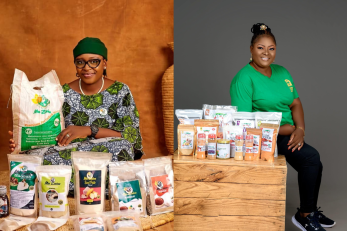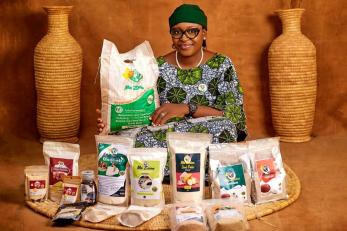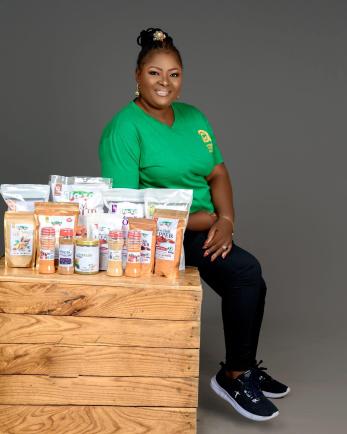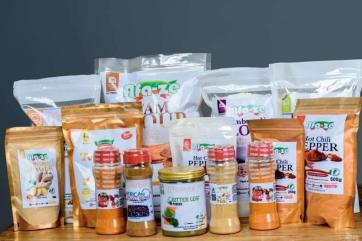Empowered to grow: How two women are transforming the agribusiness landscape

In many parts of the world, women entrepreneurs in agribusiness often face unique challenges that often hinder their business growth. These challenges range from limited access to capital to traditional societal expectations on gender roles, inadequate infrastructure, lack of resources and a dearth of business mentors. For Maryam and Roseline, two passionate agribusiness owners, these obstacles were part of their daily struggle in business. Both women dreamed of expanding their businesses and reaching new markets but were often held back by lack of resources and insufficient training.
Despite the odds, their resilience led them to the Feed the Future Nigeria Rural Resilience Activity, an initiative designed to facilitate economic recovery and growth in vulnerable, conflict-affected areas by promoting systemic change in market systems.
Maryam Yana Yakubu, a woman in agribusiness, is an innovative and visionary entrepreneur from Kebbi State, and the founder of Mainstream Lime-Light Limited, known as Ma’zaine Foods. Faced with the challenge of operating in a difficult environment and without the required equipment, Maryam could not expand her business and diversify her products as she had envisioned.
Despite the odds, Maryam remained resilient, making the most of the available resources while hoping for a turnaround. Her turning point came when she was engaged by RRA, whose gender-adaptive strategy focuses on empowering women in agriculture by providing the tools, training, and support needed for greater participation, allowing them to compete effectively with other market players. This includes supporting women in agribusiness with state-of-the-art machinery and specialized training in modern food processing techniques, transforming their businesses and paving the way for greater success.

Maryam received cowpea-processing equipment from the Rural Resilience Activity (RRA), and the impact was both immediate and transformative. Her company, Ma’zaine Foods, which started from humble beginnings, now produces an impressive range of 12 diverse products. These include millet flour, date powder, tiger nut powder, shea butter, baobab fruit powder, sweet potato flour, child formula, lactation pap, date seed coffee, date syrup, kola nut tea, and rice powder. Among these, Tom Brown, a nutrient-packed blend of grains, and lactation pap flour, designed to support nursing mothers, have gained widespread recognition.
Recalling the difficulties she faced, Maryam said, “Before receiving the cowpea equipment from RRA, sincerely, I was not bold enough to showcase my products because I had to move the raw materials from place to place for milling them and look for different sources for drying my products” .
"When I received the dehydrator from Mercy Corps, that was when I started getting recognition because we will take videos of my workers using the dehydrator and then post them on social media, and this made us get more orders from customers, and people became confident to place orders of our products. The milling machine we received, we make use of it and post on social media as well, and this has made our customers confident to outsource their products to us for milling or for contract manufacturing. People became more confident in buying our products because they noticed that we use stainless steel machinery in production. " Maryam shared.
This newfound confidence and enhanced production capacity allowed her to scale her business exponentially.
“Before receiving the equipment, I was doing the major work of production alongside two people who usually helped me. We were producing our products in kilograms, but now, we produce in tons. Currently, I have 6 permanent staff, and 10 contract staff because we do a whole lot of work now. In June 2024, we did 7 tons of production, and in July 2024, we will commence 20 tons of production. The impact of receiving the equipment cannot be quantified sincerely because these machineries made me have confidence in what I am doing. The fact that Mercy Corps could have confidence in me and give me such machinery worth so much money made me have confidence in myself and put in my best,” She expressed.
This confidence has translated into significant business milestones. Ma’zaine Foods has moved from an incubation center to a rented three-bedroom apartment to accommodate the increased production capacity, and the company has proudly obtained the Hazard and Operability Study (HAZOP) certification.
“The profit my company has acquired from January to June 2024 from production is approximately 40 million Naira. Also, the operational cost has reduced significantly, and there has been a significant increase in sales," Maryam reveals.
Maryam attributes her success to a relentless passion and consistency in production.
"We are passionate about what we do and in solving problems because that is why we are in this business to solve malnutrition problems and to help people eat and live healthily. We are buying more machinery, and the plan is to get a permanent site where we will have all the types of equipment needed for production. The company has purchased land already where we intend to start building our permanent structure." she asserts.
Beyond her business growth, Maryam’s impact on her community has been profound.
"We have been able to facilitate both paid and free training for people, and we have employed women and youth contractually, and they are being paid for the services they rendered. The paid training programs, which range from N60,000, N120,000, and N250,000, not only empower participants with valuable skills but also provide them with certificates to enhance their credentials.”
Reflecting on her journey, Maryam expresses deep gratitude for the support she has received.
“Sincerely, this support from RRA has been a major boost for me; it gave me confidence in what I am doing and seeing that an organization can support me. It made me sit up, do more, and put more effort into my business. This is something I am very grateful for. I am sure there are people like me who would want such support if there is an opportunity. All I have in my heart is just gratitude for the opportunity.”

Roseline Kwahgzan Vinimga, the CEO of Optimal Crystal Agro Ltd in Benue State, also received vital support in the form of specialized machinery from the Rural Resilience Activity. Her company specializes in food processing, producing ginger, hot chili pepper, turmeric, mixed spices, and cowpea flour. Among these, her processed cowpea flour has become one of her top-selling products.
Like Maryam, Roseline’s journey to success was not without its challenges. In the early days of her business, Roseline had very few resources and relied heavily on her household for labor. She began by processing cowpea and Bambara nut flour using a basic kitchen blender. As her business expanded, however, the demand for her products quickly outgrew her humble equipment. This led to her need for better machinery to keep up with production and fulfill growing orders.
She recalls, “Before the COVID-19 pandemic, I used my blender in the kitchen to process the cowpea and Bambara nut flour. So, when the other products were becoming a little bit more than what my blender could take, I had to go to the open market and grind with machines that the National Agency for Food and Drug Administration and Control (NAFDAC) said are not healthy for us.”
Despite these challenges, Roseline remained determined to grow her business. Her turning point came when she learned about the Rural Resilience Activity (RRA) and the opportunity for support with specialized cowpea processing equipment. Reflecting on how the opportunity came to her unexpectedly, Roseline shared:
“I posted Bambara nut flour on Facebook for sale, and somebody went into my inbox to ask me if I process beans and if my company is registered. I said yes and he requested my number and pictures of my products. He was amazed and complimented my product packaging, noting that it is of international standard. He was the one that revealed the cowpea equipment grant opportunity to me.”
With the support of Mercy Corps, Roseline received not only the cowpea processing equipment but also additional machinery that has significantly transformed her entire processing operation.
“When Mercy Corps came, I got machines like a generator, and rice destoner, and this changed the face of my processing completely. The machines I received can grind bags of beans and grind them into fine powder.”

The impact of these machines on Roseline’s business was profound. The new equipment not only enhanced the quality of her products but also significantly improved efficiency and reduced production costs.
“In a month, I can process and sell 5 to 10 bags of cowpea flour. By way of efficiency and productivity, the machines have reduced drudgery and cost. Also, it has given me peace of mind to take orders that come, and I would be able to meet them. Currently, I have 6 people working with me. There has been an increase in profit in my business as I produce and sell more products. There has also been a 60% - 70% reduction in production costs. In a year, I make a profit of N2 million Naira from my business.” She revealed.
The improved quality of her products has also earned her the trust of her customers, leading to increased sales and new opportunities.
“My cowpea flour product has passed the test at the NAFDAC lab in Kaduna State, and I can freely distribute them across Kaduna State. Because of these machines, the quality of my products has made me still have my customers, who also refer my business to others. I do many sales by referrals. Also, I got a contract from an NGO that supports IDPs to deliver protein-infused foods to pregnant women, children, and lactating mothers that are part of the IDPs,” Roseline highlighted.
Roseline’s story is a testament to the power of resilience, determination, and the right support. As she reflects on her journey, she expresses deep gratitude:
“We appreciate what Mercy Corps has done for us from the bottom of our hearts. The many women touched by this grant are blessing Mercy Corps.”
The success stories of Maryam Yana Yakubu and Roseline Kwahgzan Vinimga underscore the transformative impact of the USAID-funded Feed the Future Nigeria Rural Resilience Activity (RRA). Through the provision of specialized equipment and strategic training, both women have significantly enhanced their food processing businesses. What started as a journey of overcoming significant challenges has now positioned them as influential players in the agribusiness sector. Their achievements not only highlight the importance of empowering women in business but also demonstrate how targeted interventions can drive substantial economic and social change, fueling community growth, resilience, and sustainable development.
About the Feed the Future Nigeria Rural Resilience Activity
The Feed the Future Nigeria Rural Resilience Activity is a five-year, US$49 million program funded by the United States Agency for International Development (USAID) to facilitate economic recovery and growth in vulnerable, conflict-affected areas by promoting systemic change in market systems. The Activity is part of the U.S. Government's global hunger and food security initiative. It is aimed at empowering vulnerable households, communities and systems to cope with current shocks and stresses, and to be prepared to withstand future ones.
The Activity is implemented by Mercy Corps, in partnership with the International Fertilizer Development Center (IFDC) and Save the Children (SCI), primarily in the Northeast states of Adamawa, Borno, Gombe, and Yobe. Using market-led approaches, the Activity is moving over 800,000 individuals out of chronic vulnerability and poverty.